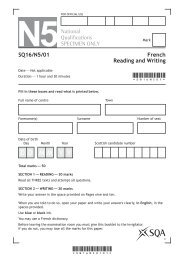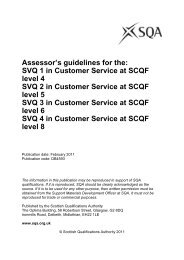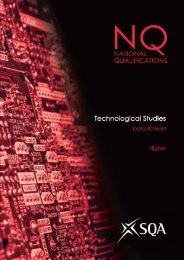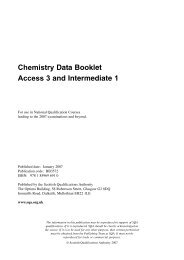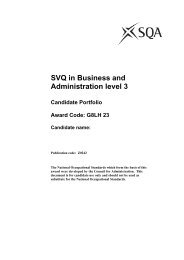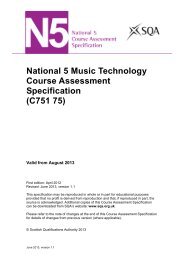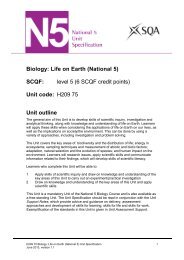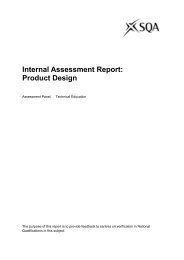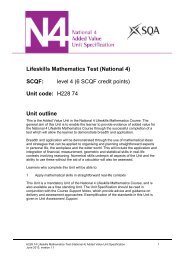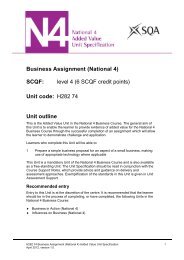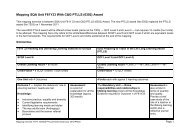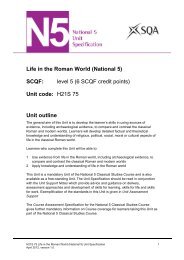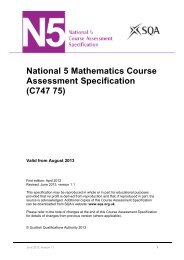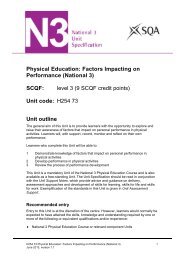National 3 Drama Course Support Notes - Scottish Qualifications ...
National 3 Drama Course Support Notes - Scottish Qualifications ...
National 3 Drama Course Support Notes - Scottish Qualifications ...
You also want an ePaper? Increase the reach of your titles
YUMPU automatically turns print PDFs into web optimized ePapers that Google loves.
Approaches to assessment<br />
The publication Building the Curriculum 5 sets out a framework for assessment<br />
which offers guidance on approaches to recognising achievement, profiling and<br />
reporting. Research in assessment suggests that learners learn best, and<br />
attainment improves, when learners:<br />
understand clearly what they are trying to learn, and what is expected of them<br />
are given feedback about the quality of their work, and what they can do to<br />
make it better<br />
are given advice about how to go about making improvements<br />
are fully involved in deciding what needs to be done next, and who can give<br />
them help if they need it<br />
(http://scotland.gov.uk/Publications/2005/09/20105413/54156)<br />
Assessment is the process of evaluating an individual’s learning. It involves<br />
generating and collecting evidence of learners’ attainment of knowledge and<br />
skills and judging that evidence against defined standards. When Units are being<br />
completed as part of the <strong>Drama</strong> <strong>Course</strong>, assessment should enable learners to<br />
develop skills, knowledge and understanding required for successful future<br />
learning.<br />
The <strong>National</strong> Assessment Resource supports teachers in developing a shared<br />
understanding of standards and expectations.<br />
Where possible, approaches to assessment should encourage personalisation<br />
and choice for learners in assessment methods and processes and support<br />
learning and teaching. Building the Curriculum 5: a framework for assessment<br />
also recommends that learners receive accurate and regular feedback regarding<br />
their learning and are actively involved in the assessment process.<br />
It is important that different approaches to assessment are used by<br />
teachers/lecturers to suit the varying needs of learners Teachers/lecturers should<br />
also use inclusive approaches to assessment taking account of any specific<br />
needs of their learners.<br />
Assessment should:<br />
cover subject content at the appropriate level without bias or stereotyping<br />
use content, resources and assessment materials that recognise the<br />
achievements and contributions of different groups<br />
where appropriate, provide a balance of assessment methods and encourage<br />
alternative approaches<br />
Assessment can take place in a variety of settings, such as classrooms, lecture<br />
rooms, workplaces (or in a simulation of workplace conditions), community and<br />
training establishments or examination halls. No matter where it takes place or<br />
what form it takes, assessment always involves observation, product evaluation,<br />
questioning or a combination of some or all of these three things.<br />
A variety of approaches can be used for assessment in <strong>Drama</strong>. Some examples<br />
are provided in the section below. These are general illustrative examples which<br />
cover the main forms of assessment applicable to <strong>Drama</strong>.<br />
<strong>Course</strong> <strong>Support</strong> <strong>Notes</strong> for <strong>National</strong> 3 <strong>Drama</strong> 13



